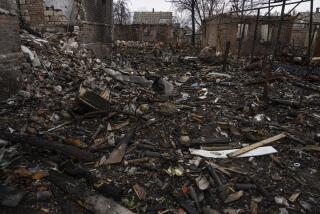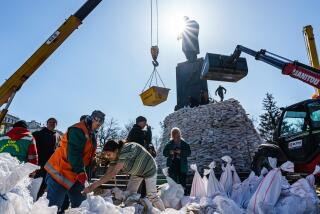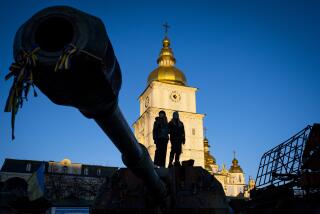Milosevic May Envision Martyr’s Place in History
- Share via
BERLIN — Defiant to the end. That is the defining trait of Yugoslav President Slobodan Milosevic, the pugnacious strongman who holds his nation in a nationalist march against Balkan neighbors to redress history’s injustice.
With his jaw thrust forward, Milosevic has urged his fellow Serbs to stand tough against the current NATO onslaught, which he casts as another international conspiracy to denigrate the Serbs.
Western politicians continue to speak of breaking Milosevic’s power to turn isolation into honor and suffering into patriotic virtue, but their hopes of bombing the mastermind of Balkan violence into submission are likely pinned on the misguided assumption that Milosevic expects victory.
Scarred by a family history of suicides and mesmerized by the tragic history of the Serbs following their 1389 defeat by Ottoman Turkey on the battlefield of Kosovo Polje, Milosevic may prefer to become the foremost casualty in an unwinnable war.
Instead of capitulating to the Western powers he has demonized, the man who has orchestrated the systematic destruction of Yugoslavia may be more disposed to take his place among Serbian martyrs.
Defeat at the hands of formidably larger forces is the cornerstone of Serbian national identity, and it has been Milosevic’s keen sense of how to make his people feel ennobled by the role of the underdog that has enhanced his power.
Analysts of the Balkan violence that Milosevic has unleashed--from Slovenia to Croatia to Bosnia-Herzegovina and now against the repressed ethnic Albanians in Serbia’s southern Kosovo province--have long predicted that the defiant Serbian leader’s last stand would be over the troubled territory he made his political springboard.
It was on Kosovo Polje’s scruffy expanse 12 years ago, amid a crowd of 15,000 disgruntled Serbs, that Milosevic launched his bid for power and a place in his people’s tragic folklore when he called on ethnic brothers to reclaim Kosovo as the national touchstone of the Serbs.
Kosovo is home to some of the most important, ancient Serbian Orthodox monasteries in the Balkans, making it the cradle of their culture and religion even after decades of official atheism during the Communist era.
The landlocked, mountainous province ringed by Albania, the rest of Yugoslavia and the former Yugoslav republic of Macedonia was the scene of medieval Serbia’s most ignominious defeat, and thus became the symbol of the Serbian people’s last moments of independence and glory.
While the Serbs lost their independence to the Turks for 500 years after the bloody Battle of Kosovo Polje, their valiant fight slowed the Ottoman advance on Christian Europe--the act of sacrifice that has helped shape the Serbian self-image as a nation of martyrs.
During those chaotic centuries of submission and insurgency, the rural Serbs of Kosovo began migrating to urban centers and the Albanian minority grew to overtake their numbers. By the middle of the 20th century, after Yugoslavia’s Communist dictator, Marshal Josip Broz Tito, lifted the federation out of the ashes of war through an industrial buildup, Albanians outnumbered Serbs in Kosovo by a huge margin.
Although a consequence of demography more than Albanian intention, Milosevic seized the “loss” of Kosovo as a lightning rod to energize resentment among Serbs over the state of their revered homeland in the Yugoslav federation.
He inflamed emotions over Kosovo in his 1988 campaign to win the Serbian presidency, and has used the perceived threat of losing it to keep Serbian patriots at his side.
While the killing and “ethnic cleansing” of Albanians in Kosovo today is being carried out by virulently nationalist police and paramilitary units loyal to Milosevic, the repressions are presented to Serbian civilians through the distortions of state-run TV as regrettable but necessary acts of self-defense against the encroachment of Islam.
Serbs in the disintegrating Yugoslav federation tended to see the 1991 secession of Slovenia and Croatia as rekindling of Western, Catholic hegemony in the Balkans, because the two northern republics were part of the Austro-Hungarian Empire before World War I.
The bloody attacks by Serbs on Muslims and Croats in Bosnia when that republic decreed independence in 1992 were likewise accepted as further evidence of revived imperial conniving, and the brutal atrocities committed against Bosnian civilians as overdue revenge for Ottoman-era repressions and the killing of Serbs by Croatian fascists allied with the Nazis during World War II.
Yugoslavia has been truncated by the secession of four of its six republics, but Milosevic has long made clear he will never accept independence for Kosovo.
Milosevic knew when he refused to sign the Western-brokered peace deal in Rambouillet, France, which would have involved the deployment of thousands of NATO troops in Kosovo for enforcement, that Serbian citizens would see the peace plan as he did: a plot to wrest Kosovo from the Serbs.
“What is at stake here is the freedom of the entire country, and Kosovo was only the door intended to allow foreign troops to come in and steal away our freedom,” Milosevic told his people as NATO jets scrambled Wednesday to attack Serbian targets in punishment for Milosevic’s refusal to sign the Kosovo peace agreement.
Yugoslav diplomats, including Zoran Jeremic, the ambassador to Germany, have repeatedly insisted that Serbs will never sign the Rambouillet peace plan, echoing Milosevic’s mantra that it violates the national interests and territorial integrity of the country.
Milosevic’s tragic childhood may explain his ability to remain aloof from both the outside world and the Serbian nationalists who revere him.
His father, a Serbian Orthodox cleric, abandoned the family and took his own life when Milosevic and his brother were young. Milosevic’s mother killed herself a decade later, as did an uncle whom the orphaned brothers had been close to.
One of the most intriguing aspects of the complex character of the Balkan strongman is his marriage to Mirjana Markovic, a hard-line Communist seen as a Lady Macbeth influence on a man whose ideology is less zealous.
Milosevic studied law at Belgrade University and worked as a banker before taking up politics, including a stint in New York, where he learned passable English. The couple have a daughter who guards her father’s media image as an editor at state-run TV, and a son renowned for high living and abuse of his parents’ status in the veritable police state.
Respected even by enemies for the tactical genius it has taken to stay in power amid war, mounting poverty and international scorn, Milosevic remains popular with a majority of an ostracized population.
He has often been criticized by foreign leaders--who fail to understand his nature--for the shortsightedness of actions that they see as aimed at retaining his political throne and territorially expanding his nation.
Yet for a man born into the savagery of World War II, marred by abandonment and likely to confront the wrath of his own people if he capitulates to NATO, going down fighting might be more appealing than surviving defeat and losing the power he spent his career accumulating.
As victim of the quest for Serbian glory, Slobodan Milosevic could win a place as a modern-day national martyr.
Defiant to the end.
More to Read
Sign up for Essential California
The most important California stories and recommendations in your inbox every morning.
You may occasionally receive promotional content from the Los Angeles Times.














